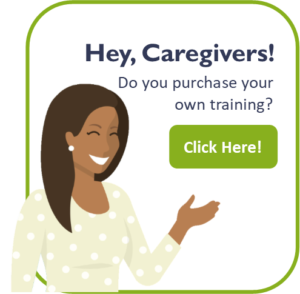
Would you answer this job ad?
HEY CAREGIVERS: Warm bodies needed to care for frail seniors. No experience necessary. Must be able to work on a moment’s notice and go without pay if we don’t have a client for you. Pay will keep you and your family living below poverty level, so plan on applying for government assistance. You may be abused, injured or suffer depression on the job, but we offer no benefits to help with any of that. Again, check out government assistance. No opportunities for advancement.
Isn’t it Obvious?
When you look at it like that, it’s no wonder there’s a “Caregiver Crisis.” PHI (the nation’s leading authority on the direct-care workforce) estimates we will need 5 million paid caregivers by 2024.
Who will fill these 5 million jobs? Who would want to?
Caregiving positions are low-paid and offer inconsistent work hours. One in four home care workers lives below the federal poverty line and over half rely on some form of public assistance. These are demanding jobs that promise high rates of injury and, frequently, no benefits.
So, How Do We Solve the Caregiver Crisis?
There is much debate about how to solve this problem. Will higher pay fix the problem? What about more training? Should benefits be mandatory? What role does the government play?
No single solution can fix every issue that contributes to the caregiver crisis. But a comprehensive initiative by PHI called 60 Caregiver Issues (#60caregiverissues) plans to tackle 60 of the most important problems. Currently, they are up Issue #21. They release a new issue (with solutions) every 1 to 2 weeks. Here are some of their ideas so far:
- ISSUE #9: Create advanced caregiver roles in your organization. With proper training and support, home care workers can take on advanced roles and additional responsibilities that better support their clients. Advanced roles can also improve job satisfaction, increase compensation, and reduce turnover. (Look for our new report next week on How To Create Advanced Caregiver Roles in your organization.)
- ISSUE #10: Support immigrants in the direct care workforce. One in four direct care workers is an immigrant. Immigrant caregivers are generally older (median age 48) with more education and more experience.
- ISSUE #12: Provide adult learner-centered training. Training that is created with the adult learner in mind increases success and improves the services they deliver.
- ISSUE #15: Improve wages and hours for workers. U.S. home care workers earn a median hourly wage of $10.49 and—because of inconsistent work hours—typically earn $13,800 annually, according to new research from PHI. Current workers can’t afford to stay in these positions and the prospect of living in poverty is unappealing to potential workers. This is an unsustainable formula.
What Can YOU Do?
While the PHI 60 Caregiver Issues project is comprehensive and expansive in scope, it can be overwhelming to think about all the issues at once. So pick one to focus on that YOU can do in your organization. Try one of these ideas:
- Improve Wages: Would you like to be the one agency in your market that pays a living wage? Make a commitment to doing just that and find a way to make it happen.
- Position Your self as the Expert in your Market with Advanced Caregiver Roles: What if you had an expert in Diabetes or a whole team of experts in Alzheimer’s and dementia on your team? Think of the marketing possibilities and increased referrals you’d get! (Be sure to check back next week for our new report on How To Create Advanced Caregiver Roles in your organization.)
- Provide the Right Training: Adding quality training to your orientation and ongoing continuing education is never a bad investment! Well-trained Caregivers are more confident and more competent, leading to higher client satisfaction and reduced caregiver turnover.
Taking small steps in your own organization may not solve the country’s growing caregiver crisis, but it can improve recruitment and retention in your own little corner of the world.
So, what will you do?


